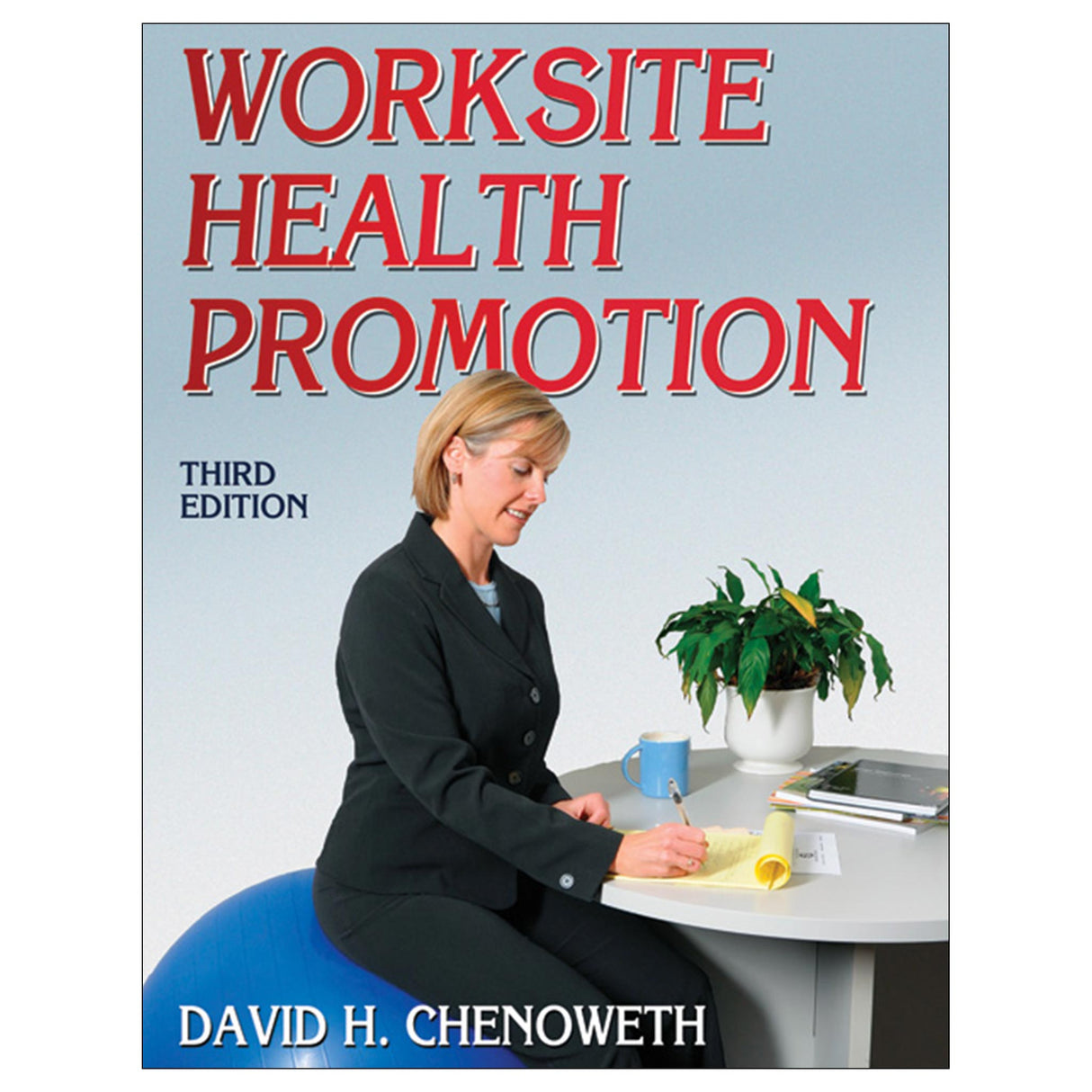Worksite Health Promotion 3rd Edition PDF
Author: David H. Chenoweth
$90.95 CAD
Access Duration: 10 Years
In today’s difficult economic environment, worksite health promotion programs are becoming increasingly important as employers look for ways to contain health care costs and improve productivity. The newly updated Worksite HealthPromotion, ThirdEdition, presents students and professionals with all of the information they need to create programs that address these issues, improving both the physical health of the employees and the financial health of the organization.
Based on Dr. Chenoweth’s expertise as a professor and a professional consultant, the text combines theoretical principles and research with practical applications and real-world examples to give readers a comprehensive and immediately useable introduction to the field. The text begins with an overview of worksite health promotion that illustrates the importance of these programs in today’s workplace. This is followed by a discussion of the economic forces that make implementing worksite health programs so advantageous for employers. The text’s clear presentation of program benefits highlighted in economic-based evaluations will prepare readers to make a case for their own interventions. Worksite Health Promotion, Third Edition, provides a step-by-step approach to planning, implementing, and evaluating programs. Readers will explore key topics such as assessing employees’ needs, setting appropriate goals, gaining management buy-in, budgeting, and program evaluation. They will also find full coverage of programming issues, including strategies for developing programs for healthy lifestyles, medical self-care, and disability management. The specific challenges of programming for small businesses and multisite workplaces are also addressed.
The third edition has been fully revised with an improved organization and updated charts, tables, and references as well as the following additions that reflect the latest research and trends in the field:
•Updated information on ADA, HIPAA, and GINA standards as they relate to worksite health promotion that will help readers better understand the implications of the legislation for their own businesses
•New sections on health management, health coaching, budget development options, and present value adjustment
•More information on integrated health data management systems, e-health technology, nutrition and weight control programs, fostering a healthy culture, and reducing stress in the workplace
•Expanded coverage of program evaluation, including new sections on break-even analysis and determining present versus future value as well as improved illustrations of econometric-based evaluations and evaluation design
•A larger focus on career development with updated information on certification options, intermediate-level practitioner competencies, and internship and job searches that will help students explore their professional options and prepare for their future in the field
Improved textbook features make this leading text more classroom friendly than ever. Learning objectives, end-of-chapter overviews, and a new glossary of key terms will help students focus on the most important concepts in each chapter. Updated Looking Ahead and What Would You Do? sidebars will aid them in applying the information and can serve as the starting point for class discussions or assignments. A new instructor guide gives faculty great help in preparing for courses. It contains sample syllabi (including a syllabus for increasingly popular online offerings), a weekly instructional guide, and course outlines. Also new to this edition is an image bank with most of the art and tables from the text.
Current practitioners looking for ideas and strategies for building a healthier workforce as well as students just beginning an exploration of the field can depend on Worksite Health Promotion, Third Edition, to inspire and inform. Both groups will find that this text offers the business knowledge, resources, and insights to guide them in this diverse and exciting career.
Part I: Initiating Worksite Health Promotion
Chapter 1: The Case for Worksite Health Promotion
Factors Behind Rising Health Care Costs
Health Costs and Health Promotion
A Brief History of Worksite Health Promotion
Why Businesses Offer Health Promotion
Chapter 2: Determining Employees’ Needs and Interests
Identifying Employees’ Needs
Assessing Employees’ Needs
Part II: Planning Worksite Health Promotion Programs
Chapter 3: Preparing Program Goals
Establishing Vision and Mission Statements
Setting Appropriate Goals
Anticipating Realistic Results
Chapter 4: Establishing Healthy Lifestyle Programs
Programming Philosophy
Exercise and Physical Fitness
Nutrition
Weight Control
Back Health
Prenatal Health
Smoking Control
AIDS Education and HIV Disease Prevention
Medical Self-Care and Health Care Consumerism
Financial Wellness
Chapter 5: Funding and Resource Considerations
Allocating Resources
Funding WHP
Preparing a Budget
Preparing Your Proposal
Positioning WHP in an Integrated Framework
Part III: Providing and Evaluating Worksite Health Promotion
Chapter 6: Building a Healthy Worksite Environment
Cultivating a Healthy Culture
Reducing Occupational Injury
Personalizing Disability Management
Implementing Employee Assistance Programs
Creating a Less Stressful Worksite
Chapter 7: Promoting and Launching Worksite Programs
Developing a Marketing Strategy
Using E-Health Technology
Preparing Employees to Take Action
Developing a Health Fair
Conducting Employee Health Screening
Managing Risk and Liability
Giving the Program a Trial Run
Chapter 8: Evaluating Health Promotion Efforts
Identifying Program Stakeholders
Establishing Goals for Evaluation
Developing Intervention Goals
Establishing Measurable Objectives
Developing Your Evaluation Approach
Choosing an Evaluation Design
Emphasizing Economic-Based Evaluations
Part IV: Managing Essential WHP Considerations
Chapter 9: Overcoming Challenges of Company Size
Small Businesses
Multisite Operations
Chapter 10: Building a Career in WHP
Academic Preparation
Professional Certification
Professional Resources
Job Seeking
Launching a successful worksite health program
What role should worksite health promotion play in today's global economy?
Instructor guide. The instructor guide features sample syllabi that can be used in either traditional classroom or online courses, a weekly instructional guide, course outlines, and sample guidelines for group presentations.
Image bank. The image bank includes most of the figures and tables from the text, sorted by chapter. Images can be used to develop a customized presentation based on specific course requirements. A blank PowerPoint template is provided so instructors can quickly insert images from the image bank to create their own presentations.





